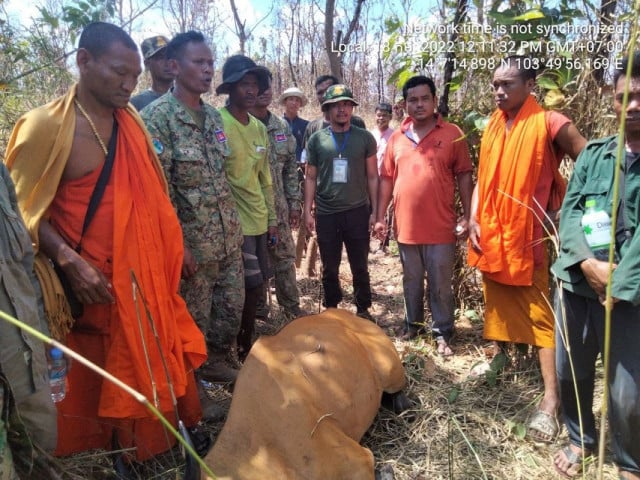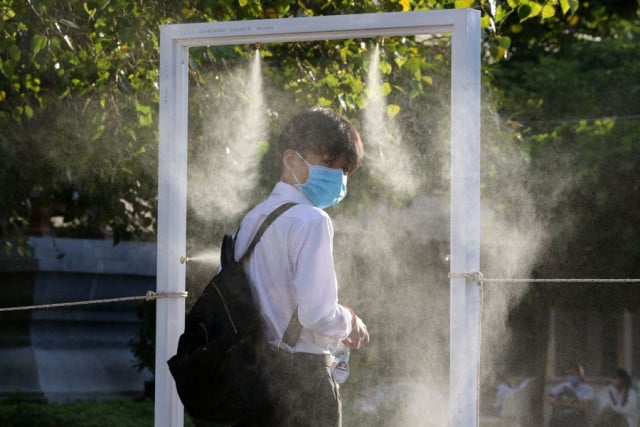A Rare Banteng Is Killed by Poachers in a Wildlife Sanctuary in Oddar Meanchey Province

- By Po Sophea
- and Phoung Vantha
- February 20, 2022 5:35 PM
Found in Southeast Asia, this animal is on the world’s list of endangered species
PHNOM PENH--A male banteng weighing around 300 kilograms died in the Sorng Rukhavorn Wildlife Sanctuary in Oddar Meanchey Province on Feb. 18 due to injuries caused by an illegal hunter’s trap.
"When we heard the dogs barking, our group headed in the direction of the sound,” said Bun Saluth, a member of the Sorng Rukhavorn Forest Community. “We arrived just in time to see dogs biting the banteng...the hunter ran away, so we were only left with the corpse of the banteng.” The forest community group was unable to prevent the hunter from escaping, he said.
The illegal trap was placed in the forest near Kork Samphor Village in Along Veng District’s Lomtong Commune, Saluth said. The banteng may have been trapped for as long as one month: One of its legs was torn apart by the trap and its flesh had been rotting, he said.
"Examining the animal, it was found that its right hind leg was broken, its head and horns were broken due to beating by the hunter,” he said. “In addition, there were dog bite marks."
Cases of bantengs dying due to illegal traps are reported every year in the Sorng Rukhavorn Wildlife Sanctuary, and the number of illegal traps keeps on increasing from year to year, Saluth said.
At least five bantengs died due to those hunter’s traps in 2020, six bantengs were killed in 2021, and one has died in the first two months of 2022, he said.
According to Wildlife Alliance, bantengs have been classified as an endangered species. There are only 8,000 or so bantengs remaining in the world today, and 60 percent of them are in Cambodia.
The Sorng Rukhavorn Forest Community group removed about 1,000 illegal traps in 2020, more than 1,000 traps in 2021, and now the community group is working every day to remove traps, Saluth said.
All species are facing life-threatening traps, he said.
Illegal hunting keeps on increasing due to the demand for wildlife meat on the market, he said. "People who come to hunt in this forest: There are people waiting outside to buy.
"The trader first provides traps and ropes to the hunter, and when the hunter catches a wild animal and comes to sell the meat, the trader deducts the price of the traps off the hunter’s fee" Saluth explained. " If this activity continues, the animals will disappear one by one from the forest of Sorng Rukhavorn as well as in the other forests."
Natural resources and wildlife will only survive if people join together to take care of them, do not encourage illegal wildlife trade and take part in protecting the forests and nature, Saluth said. He added that the support of the Cambodian government and the local authorities is also a major factor to make sure these resources are protected in the country.
Try Sitheng, head of the Phnom Tamao Wildlife Rescue Centre and a rescue officer, expressed deep regret that Cambodia continues to lose rare animals due to poaching and trapping.
He called on all people in the country to participate in protecting, caring for and conserving wildlife so that they can continue to maintain their presence for the next generations of Cambodians to know and care for.
"If you do not support trade or consumption of wildlife, hunting or trapping will be reduced and there will be no illegal wildlife trade in the market," Sitheng said.















